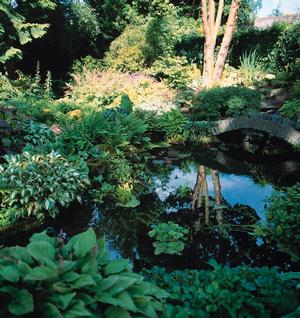Post category: Garden pools
Maintenance
Generally, a large pool requires less attention than a small one. A larger body of water is more stable than a small volume which tends to get polluted and overgrown more quickly. If a pool can be fed naturally by a small trickle of water, it makes maintenance much easier.

Garden pools
A large pool takes up space that might otherwise be sown down to grass, usually. Only requiring the clearing out of surplus plant growth every year, a pool is easy to maintain. It takes a great deal of effort to put in place but relatively little subsequently. Because they are generally deeper, large pools contain relatively more water and a natural balance is more easily achieved and maintained.
A small pool tends to warm up more quickly, goes green with algae more readily and becomes contaminated with leaves and debris more easily. Plants fill the space of a small pool more quickly and need reduction more frequently. If fish are kept, they need feeding regularly. In terms of ornamental value, a small pool is far more effort than a large one, and probably best avoided if the aim is to reduce effort.


